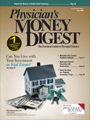Publication
Article
Physician's Money Digest
Close-Up: Bypass Trust
Author(s):
n.
Bypass Trust: An irrevocable trust that allows the passing of one's assets to their children to reduce estatetaxes. Also called a marital shelter trust, credit shelter trust, or A/B trust.
Complete
Book of Money
Under normal circumstances, when a marriedperson dies, the government allows the survivingspouse to inherit all of the deceased'sassets without incurring estate taxes. Inother words, according to Stephen Pollan's (HarperBusiness; 2000), there is nolimit to how much can be passed on, even if it totals billionsof dollars. However, when the surviving spousedies, everything changes.
At that time, the government steps in to take its cut.And although the amount of the estate that can beexempt from estate taxes is increasing while the ceilingon the estate tax rate is coming down, it's still a sizablechunk. For example, for someone who passes away in2005, the amount that is exempt from estate taxes is$1.5 million, with an estate tax ceiling of 49%. Thatmeans that every dollar of your estate over $1.5 millionis subject to federal estate taxes—unless youimplement a bypass trust.
How It Works
Consider this example offered by the law offices ofLaurie Shigekuni of a couple with no estate plan orbypass trust in place. The couple, Bill and Jane, have$2 million in community property assets. If Bill dies in2005 and leaves the entire estate to his spouse, Janewould not owe federal estate taxes. However, if Janepasses away later in 2005, her heirs would have to payestate taxes on $500,000, or approximately $155,800in federal estate taxes.
The above scenario would be quite different had thecouple established a bypass trust. With a bypass trust,when one spouse passes away, the trust is divided intoseparate parts. According to Shigekuni, the deceasedspouse's part is called the bypass trust and the survivingspouse's part is called the survivor's trust. No estate taxis imposed on the bypass trust, which is why it helpsreduce or eliminate estate taxes for married couples. Thesurviving spouse could receive income from the bypasstrust, but access to the principal is severely restricted.
Now consider the above scenario but with a bypasstrust in place. Bill and Jane own $2 million in communityproperty assets, and Bill passes away early in 2005.One million dollars would fund the bypass trust forBill's heirs, while another $1 million would go into asurvivor trust for Jane. If Jane passes away later in 2005,her heirs would inherit the $1 million in her survivortrust, Bill's heirs would inherit the $1 million in hisbypass trust, and no federal estate tax would be due.
Trust Guidelines
As mentioned, use of the assets in the bypass trust isextremely limited, and that's one of its key advantages.In this way, both spouses can ensure that the survivingspouse will not disinherit their heirs, which might occurif one spouse has children from a previous marriage.
According to Dianne Reis, a Texas-based attorney,the surviving spouse cannot have an unrestricted right towithdraw principal from the bypass trust. However,they can be given the right to withdraw principal to providefor their own health, education, maintenance, orsupport. The surviving spouse can also be given the rightto withdraw up to $5000 or 5%, whichever is greater,of the principal per year for any purpose, as well asaccess to all income produced by the bypass trust.
In addition, the surviving spouse can be given theright to name in their will specific persons to whom thetrust will be left. The deceased spouse could have providedauthorization to leave the trust to any of the couple'snieces or nephews, or to divide the trust as theyplease. Alternately, the surviving spouse could be leftwith no discretion as to who inherits the trust.
However, the living spouse has unlimited access tothe survivor's trust. The assets in this trust are completelyunder the control of the surviving spouse, whocan even revoke the trust at any time.
Bypass trusts are extremely useful, but they canalso become quite complicated. To ensure a bypasstrust is set up to meet the needs of you and yourspouse, enlist the advice of a financial advisor or estateplanning attorney. As Reis points out, even the slightestdrafting error could cost hundreds of thousands ofdollars in taxes.
Who Should Use a Bypass Trust?
The Complete Book of Money
Writing in (Harper-Business; 2000), Stephen Pollan points out that anyonewho has assets greater than the estate taxexemption is a candidate for a bypass trust. Theymight not be the most convenient of financial vehicles,but they could serve a valuable purpose.
Are you a candidate? To find out, Pollan suggestsdoing a complete inventory of your assets. An estateof $1.5 million might seem like a lot, but if yourhome alone is worth $750,000 or more, and youhave a second or vacation home, the value of yourestate can add up pretty fast. Factor in your cars andother possessions, including insurance policy proceedsand investments, then subtract the debts, andthe bottom line might be greater than you think.
Pollan also offers the reminder that for a bypasstrust to work, couples must own property separately,as community property, or as tenants-in-commonwithout right of survivorship. A bypass trust cannotbe funded with property that is jointly owned.
Pop Quiz
1) Another name for a bypass trust is a(n)
- Marital shelter trust
- Credit shelter trust
- A/B trust
- All of the above
2) With a bypass trust, when one spouse passes away,the trust is
- Divided into two separate parts
- Divided into three separate parts
- Divided into two separate but unequal parts
- Unchanged
3) The surviving spouse has unlimited access to thebypass trust. True or false?
- True
- False
4) The surviving spouse has unlimited access to thesurvivor trust. True or false?
- True
- False
5) For a bypass trust to work, the rules require thatcouples must own property
- Separately
- As community property
- As tenants-in-common
- All of the above
Answers: 1) d; 2) a; 3) b; 4) a; 5) d.
